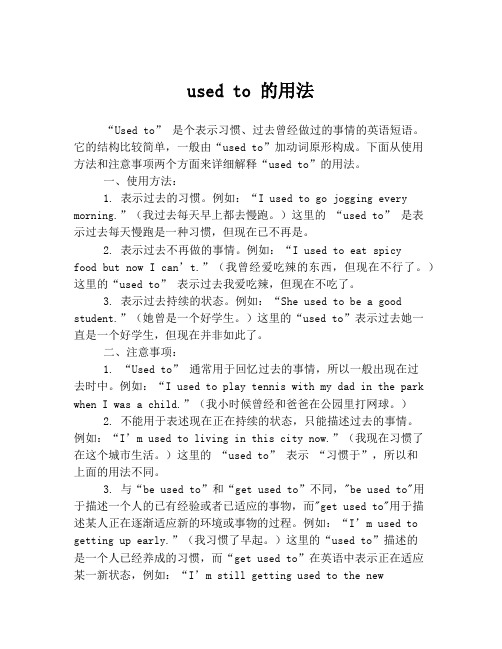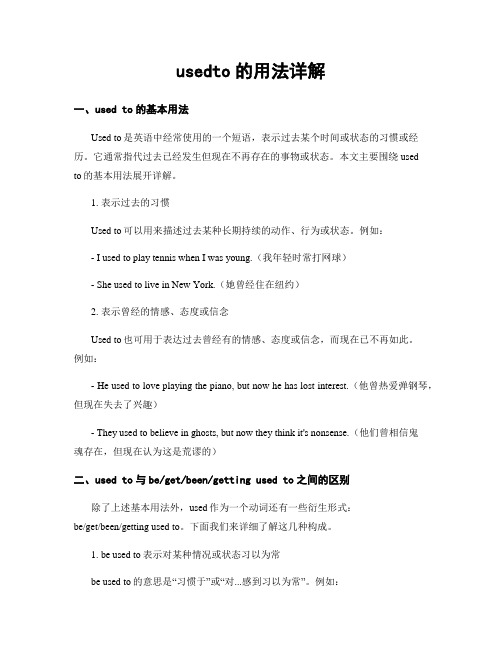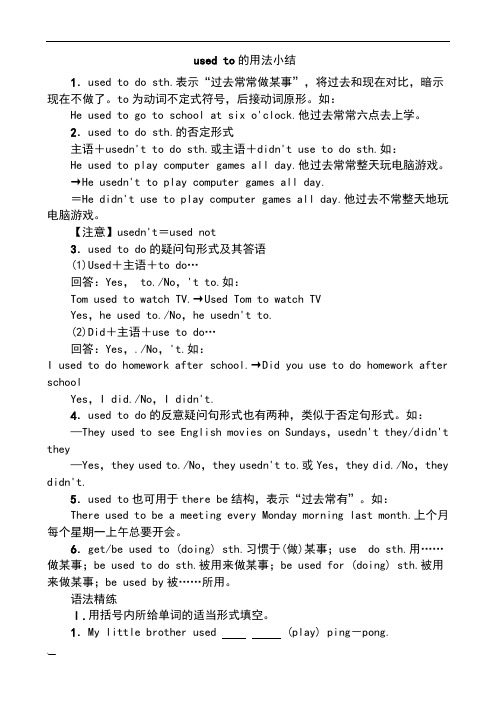usedto的用法小结
Usedto用法小结

Usedto用法小结情态动词used to在句子中的用法一、Used to表示过去的习惯动作或状态,现在已不存在,在间接引语中,其形式可不变。
如:1.He told us he used to play football when he was young.他告诉我们他年轻时经常踢足球。
2.I weigh less than I used to.我的体重比以前轻了。
3.He is used to eating out all the time.他已经习惯在外面吃饭了。
4.You'll get used to it.你会习惯的。
5.Are you used to the food here?你习惯吃这儿的饭菜吗?6.I used to get up early and take an hour's walk before breakfast.我过去常常起床很早并且在早餐前散步一小时。
7.Women used to think they were on the shelf at 30.过去女人一到30岁就认为是过了结婚年龄。
8.Jack used to assist Mary in her lessons.杰克过去常常帮助玛丽学习功课。
二、在疑问句、否定句、否定疑问句或强调句中,可有两种形式:1、疑问句Did you use to go to the same school as your brother?Used you to go to the same school as your brother?2、否定句I usedn't to go there.I didn't use to go there.3、否定疑问句Usen't you to be interested in the theatre?Didn't you use to be interested in the theatre?4、强调句I certainly used to smoke,but it was a long time ago.I certainly did use to smoke,but it was a long time ago.5、其反意疑问句或简略回答中,也有两种形式:She used to be very fat,didn't she? (口语+常用)/ use(d)n't she? (正式+过时)Did you use to play chess? Yes,I did.Used you to get up early in the morning? Yes,I did. (Yes,I used to.)Used to 用法小结01 一、掌握used to的构成used to+动词原形,其中to是不定式符号02 二、掌握used to用法。
usedto的用法总结都有哪些(8篇)

usedto的用法总结都有哪些(8篇)be used to+动词原形,这一结构表示“被用来……”,其中used为过去分词。
比如: 篇一The knife is used to cut meat. 刀是用来切肉的。
反意疑问句篇二我变反意疑问句时,附加部分可用use(d)n’t或didn’t。
比如:This house used to be a bookshop, didn’t/use(d)n’t it? 这房子过去是一个书店,对吗?He didn’t use to drink, did he? 他以前不喝酒,对吗?我的几个“兄弟”一般疑问句篇三我的一般疑问句形式可以用Did+主语+use to…?或Used+主语+to…?句型。
比如:Did you use to play the piano? 你以前常常弹钢琴吗Yes, I did. 是的,我常弹。
(No, I didn’t.不,我不经常弹。
be used for+名词/动名词,这一结构表示“用于”或“被用来……”,介词for说明用途。
比如: 篇四A stamp is used for sending letter. 邮票用来寄信。
通过我的“自我介绍”,大家对我该有所了解了吧,可别把我与我的“几个兄弟”混淆哟!【趁热打铁】用used to, be used to, get used to, be used for 填空:1. She ____ be a history teacher.2. The pen ____ writing.3. His father ____ drinking coffee after suppr.4. This machine ____ make bread.5. Her mother ____ tell stories when she was young.6. There ____ be an old house near the lake.7. She ____ cold weather after having lived here for two years.Key:ed to 2.is used for 3.gets used to4.is used ed ed to 7.was/got used ed, tonot to have long hair.) 她以前没有长头发。
used to的用法总结

to go to school by bike.
他过去住在农村,但是现在他习惯住在城市。 He used to live in village, but now he is used to live in city.
过去有一个非常聪明的老头住在这个村子里
There used to be a clever old man in the village.
used to do sth 过去常常做某事 She used to swim in winter
be used to do sth = be used for doing sth 被用于做某事
The pen is used to write on the books. The pen is used for writing on the books
be used to doing sth 习惯于做某事, 适应某事
She is used to swimming in winter.
他过去经常走路去学校,但是现在他习惯骑自行车去。
Used to的运用在there be • There used t句o b型e 中
There used to be a lot of teachers in the school.
100年前曾经有一个美丽的乡村在这个国家。 10.0 years ago, there used to be a beautiful village in the country
电脑被用来帮助学生学习。 Computer is used to help students to learn
英语中used to 用法

英语中used to 用法
used to “过去常常”,仅用于过去时态中,通常用于所有人称。
1、used to +动词原形,表示过去(有规律的)习惯或过去某一时期的的状况,但现在已不存在。
2、其反意疑问句简略回答中,也有两种形式:didn't ,use (d)n't
3、used to 和would的区别
(1)used to 可表示过去经常发生的动作或存在的状态,而would仅表示过去习惯性或重复性的动作。
(2)used to 强调过去的行为同现在的对比,含有“过去如此,现在已不再这样了”之意。
Would仅表示过去习惯性动作,没有预先在对比的含义。
(3)used to不能跟表确定时间短的时间状语连用。
(4)used to 可用于无人称句和存在句,而would则不可。
4、used to与be used to do和be used to doing
(1)used to表示“过去常常”隐含现在不这样了,其中to是不定式符号,后跟动词原形,仅用于过去时态。
(2)be/get/become used to 表示“习惯于”时,意为“变得习惯于“或“开始习惯于”。
(3)be used to do表示“被用来”。
used_to用法

used to的用法归纳1. 基本用法特点used to的意思是“过去经常”,其中的to是不定式符号,不是介词,所以其后接动词原形(不接动名词)。
如:He used to live in Paris. 他过去一直住在巴黎。
I used to write poetry when I was young.我年轻时常常写诗。
"Do you play golf?" "No, but I used to." “你打高尔夫球吗?”“不打,但我过去打。
”2. 如何构成否定式和疑问式used to作为情态动词,可直接在used后加not构成否定式,直接将used置于句首构成疑问式,但与一般的情态动词不同的,它也可像普通动词那样借助助动词did构成否定式和疑问式。
如:He usedn’t [didn’t use] to come. 他过去不常来。
You used to go there, usedn’t[didn’t] you? 你过去常到那儿去,是吗?Where did you use to live? 你过去是住哪儿的?3. used to与副词连用时的位置与often, always, never等副词连用时,通常置于副词之后,也可置于副词之前。
如:I always used [used always] to be afraid of dogs. 我过去老是怕狗。
4. used to 与be/get used to doing的用法比较(1)used to 意为“过去经常”,其中的to 是不定式符号,后接动词原形。
如:He used to live in Paris. 他过去一直住在巴黎。
(2)be used to 意为“习惯于”,其中的to是介词,后接动词要用动名词。
如:He is used to living in the country. 他已习惯于住在乡下。
5. used to 与would的用法比较(1)两者都表示过去的习惯,当表示过去习惯性的动作时,可互换。
used to 的用法

used to 的用法“Used to” 是个表示习惯、过去曾经做过的事情的英语短语。
它的结构比较简单,一般由“used to”加动词原形构成。
下面从使用方法和注意事项两个方面来详细解释“used to”的用法。
一、使用方法:1. 表示过去的习惯。
例如:“I used to go jogging every morning.”(我过去每天早上都去慢跑。
)这里的“used to” 是表示过去每天慢跑是一种习惯,但现在已不再是。
2. 表示过去不再做的事情。
例如:“I used to eat spicyfood but now I can’t.”(我曾经爱吃辣的东西,但现在不行了。
)这里的“used to” 表示过去我爱吃辣,但现在不吃了。
3. 表示过去持续的状态。
例如:“She used to be a good student.”(她曾是一个好学生。
)这里的“used to”表示过去她一直是一个好学生,但现在并非如此了。
二、注意事项:1. “Used to” 通常用于回忆过去的事情,所以一般出现在过去时中。
例如:“I used to play tennis with my d ad in the park when I was a child.”(我小时候曾经和爸爸在公园里打网球。
)2. 不能用于表述现在正在持续的状态,只能描述过去的事情。
例如:“I’m used to living in this city now.”(我现在习惯了在这个城市生活。
)这里的“used to” 表示“习惯于”,所以和上面的用法不同。
3. 与“be used to”和“get used to”不同,"be used to"用于描述一个人的已有经验或者已适应的事物,而"get used to"用于描述某人正在逐渐适应新的环境或事物的过程。
例如:“I’m used to getting up early.”(我习惯了早起。
usedto的用法详解

usedto的用法详解一、used to的基本用法Used to是英语中经常使用的一个短语,表示过去某个时间或状态的习惯或经历。
它通常指代过去已经发生但现在不再存在的事物或状态。
本文主要围绕usedto的基本用法展开详解。
1. 表示过去的习惯Used to可以用来描述过去某种长期持续的动作、行为或状态。
例如:- I used to play tennis when I was young.(我年轻时常打网球)- She used to live in New York.(她曾经住在纽约)2. 表示曾经的情感、态度或信念Used to也可用于表达过去曾经有的情感、态度或信念,而现在已不再如此。
例如:- He used to love playing the piano, but now he has lost interest.(他曾热爱弹钢琴,但现在失去了兴趣)- They used to believe in ghosts, but now they think it's nonsense.(他们曾相信鬼魂存在,但现在认为这是荒谬的)二、used to与be/get/been/getting used to之间的区别除了上述基本用法外,used作为一个动词还有一些衍生形式:be/get/been/getting used to。
下面我们来详细了解这几种构成。
1. be used to表示对某种情况或状态习以为常be used to的意思是“习惯于”或“对...感到习以为常”。
例如:- I am used to the hot weather here now. (我现在已经适应了这里的炎热天气)- She is used to working late nights.(她习惯晚上加班)2. get used to表示逐渐适应某种新的事物、环境或情况get used to意为“适应”,常用于表达一个人慢慢、渐渐地适应新环境的过程。
used to的用法小结

used to的用法小结1.used to do sth.表示“过去常常做某事”,将过去和现在对比,暗示现在不做了。
to为动词不定式符号,后接动词原形。
如:He used to go to school at six o'clock.他过去常常六点去上学。
2.used to do sth.的否定形式主语+usedn't to do sth.或主语+didn't use to do sth.如:He used to play computer games all day.他过去常常整天玩电脑游戏。
→He usedn't to play computer games all day.=He didn't use to play computer games all day.他过去不常整天地玩电脑游戏。
【注意】usedn't=used not3.used to do的疑问句形式及其答语(1)Used+主语+to do…回答:Yes, to./No,'t to.如:Tom used to watch TV.→Used Tom to watch TVYes,he used to./No,he usedn't to.(2)Did+主语+use to do…回答:Yes,./No,'t.如:I used to do homework after school.→Did you use to do homework after schoolYes,I did./No,I didn't.4.used to do的反意疑问句形式也有两种,类似于否定句形式。
如:—They used to see English movies on Sundays,usedn't they/didn't they—Yes,they used to./No,they usedn't to.或Yes,they did./No,they didn't.5.used to也可用于there be结构,表示“过去常有”。
- 1、下载文档前请自行甄别文档内容的完整性,平台不提供额外的编辑、内容补充、找答案等附加服务。
- 2、"仅部分预览"的文档,不可在线预览部分如存在完整性等问题,可反馈申请退款(可完整预览的文档不适用该条件!)。
- 3、如文档侵犯您的权益,请联系客服反馈,我们会尽快为您处理(人工客服工作时间:9:00-18:30)。
used to的用法小结
1.used to do sth.表示“过去常常做某事”,将过去和现在对比,暗示现在不做了。
to为动词不定式符号,后接动词原形。
如:
He used to go to school at six o'clock.他过去常常六点去上学。
2.used to do sth.的否定形式
主语+usedn't to do sth.或主语+didn't use to do sth.如:
He used to play computer games all day.他过去常常整天玩电脑游戏。
→He usedn't to play computer games all day.
=He didn't use to play computer games all day.他过去不常整天地玩电脑游戏。
【注意】usedn't=used not
3.used to do的疑问句形式及其答语
(1)Used+主语+to do…
回答:Yes,to./No,'t to.如:
Tom used to watch TV.→Used Tom to watch TV
Yes,he used to./No,he usedn't to.
(2)Did+主语+use to do…
回答:Yes,./No,'t.如:
I used to do homework after school.→Did you use to do homework after school
Yes,I did./No,I didn't.
4.used to do的反意疑问句形式也有两种,类似于否定句形式。
如:
—They used to see English movies on Sundays,usedn't they/didn't they
—Yes,they used to./No,they usedn't to.或Yes,they did./No,they didn't.
5.used to也可用于there be结构,表示“过去常有”。
如:
There used to be a meeting every Monday morning last month.上个月每个星期一上午总要开会。
6.get/be used to (doing) sth.习惯于(做)某事;use do sth.用……做某事;be used to do sth.被用来做某事;be used for (doing) sth.被用来做某事;be used by 被……所用。
语法精练
Ⅰ.用括号内所给单词的适当形式填空。
1.My little brother used (play) ping-pong.
2.I'm used to (get) up early.
3.Wood is used (make)desks,chairs,tables and so on.
4.you (use) to be short
5.Today,computers (use)in both cities and towns.
Ⅱ.根据汉语提示完成句子,每空一词。
6.He (以前是) a history teacher in our school.
7.There (以前有) an old temple near the village.
8.She (习惯于散步) after supper.
9.Wood (被用来制造) paper.
10.(已习惯于) eating with chopsticks.
Ⅲ.按要求完成下列句子,每空一词。
11.My brother used to play football after school.(改为一般疑问句并作否定回答)
—your brother football after school
—No,he .
12.Tom used to be a quiet boy.(改为否定句)
Tom a quiet boy.
13.There used to be an old hospital behind our school.(完成反意疑问句)
There used to be an old hospital behind our school,
14.I used to see my aunt once__a__month.(对画线部分提问)
you use to see your aunt
15.Mary used to stand at the window and wave goodbye.(改为一般疑问句) Mary stand at the window and wave goodbye。
